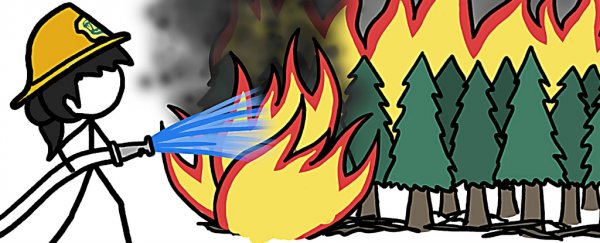
As climate change advances, we're seeing more and more wildfires burn out of control across the planet. As a result, more money and effort is being poured into firefighting and emergency services. But as the latest episode of MinuteEarth explains, this may actually be doing more harm than good. In fact, science shows that our best weapon against fire… is actually more fire.
Thanks to the amazing work of firefighters, there's been a steady decline in the number of wildfires burning in the US since 1970. But fires today also burn faster, hotter, and bigger than ever before, and the total area of land burned each year in the US has more than doubled in the same amount of time.
So what's going on? As the video explains, when there are fewer fires, forests become denser and therefore more flammable. Without regular burning, the combustible needles dropped by young conifers build up, as does dry leaf matter and old branches.
This means that when a fire does start, it's going to quickly escalate, and often can start burning out of control and do some serious damage before firefighters get there.
But we can actually prevent those extreme wildfires before they happen, by clearing out all that dense forest, either through selective logging or controlled fires of our own, lit at times when it's not too windy or dry.
That might sound counterintuitive, but research has shown that this strategy can make fires cooler, slower, and less destructive. When a fire burned through Washington State in 2006, 92 percent of trees in unmanaged forests perished, while just 49 percent died in areas that had been thinned out by cutting or controlled burns.
And in 2002 patches of controlled forest helped to put the brakes on a fire burning its way across Arizona's pine forests.
In fact, there's so much evidence behind controlled burning that most forest managers now prescribe it. So why isn't happening? We'll let you watch the video above to find out, but we will say that, as usual, there's politics involved. Let's just hope that doesn't stand in the way of good science for long.
